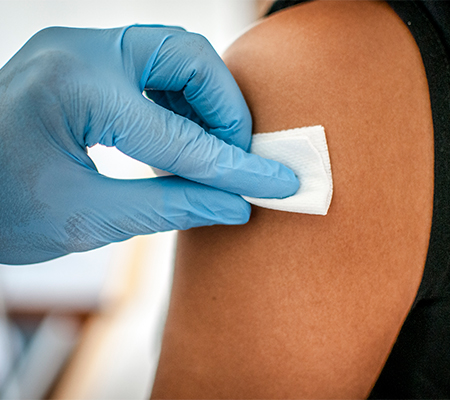
Getting the HPV vaccine may help to prevent oropharyngeal cancer, a certain type of oral cancer.
If you have oral sex with someone who has human papillomavirus (HPV), it can cause a specific type of oral cancer called oropharyngeal cancer.
Oropharyngeal cancer is cancer on specific parts of the back of your throat including the tonsils and back third of your tongue. According to the Centers for Disease Control (CDC), HPV causes 70 percent of this type of oral cancer in the U.S.
“This is something most people are not aware of,” said Neel Shimpi, B.D.S., Ph.D., oral health associate research scientist at Marshfield Clinic Research Institute. “Promoting HPV education among high school students is essential to increase awareness about HPV infection and ways to prevent it.”
HPV can be transmitted by direct sexual contact with an infected partner. For example, contact with the mouth and throat. HPV can cause an infection, which can then cause cancer as soon as a few years later.
Preventing oropharyngeal cancer
The HPV vaccine can prevent cervical cancers. While research has not definitively shown that the HPV vaccine prevents it, doctors believe it is likely to prevent this type of oral cancer.
“Recent research studies suggest that HPV vaccination reduces infections in the mouth associated with HPV that are major risk factors for getting cancers,” said Shimpi.
The vaccine protects from cervical cancers caused by the same types of HPV that cause oropharyngeal cancer.
CDC recommends 11- to 12-year olds receive two doses of HPV vaccine at least six months apart. Those who start the series later, ages 15-26, need three doses.
Using condoms and dental dams also prevent transmitting HPV and causing oropharyngeal cancer. Alcohol and tobacco are other common risk factors of oral cancer.
Symptoms of oral cancer
Common symptoms include:
- Sore throat for an extended period of time
- Earaches
- Hoarse throat
- Swollen lymph nodes or lump in neck
- Pain from swallowing
- Unexplained weight loss
If you are concerned that you may have oropharyngeal cancer, talk to your doctor or dentist right away.


May I simply just say what a comfort to uncover somebody that actually knows what they're discussing over the internet. You actually know how to bring an issue to light and make it important. A lot more people need to read this and understand this side of the story. I was surprised you are not more popular since you certainly have the gift.
What can be done for someone that has HPV? Could the vaccine help even though there are no current symptoms?
Hello – It's important you share this with your primary care provider who knows your medical history and current conditions. He/she can best answer any specific questions you have. Thanks – Jake